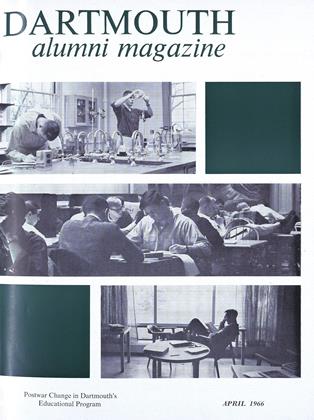By Prof. JacobNeusner (Religion). New York: SchockenBooks Inc., 1965. 127 pp. $3.95.
Professor Neusner's recent book represents a welcome addition to that woefully small group of popular works in which genuine religious scholarship and deep religious conviction nourish and complement each other.
History and Torah consists of eight independent essays somewhat loosely bound together by an eloquent "Introduction" which attempts to define the author's religious situation. As might be anticipated, all of the essays are not of equal substance. For me, chapters two, four, five, and six were too occasional in nature to have merited reprinting. In these, serious theological issues for ludaism were raised; but the brevity with which they were explored precluded much needed elaboration. At best these are tantalizing for their hints of profundity; at worse they appear somewhat trite. The third essay, on the eighty-ninth Psalm, is a homiletical masterpiece, a model of its genre, but remains too divorced from historico-critical exegesis for my tastes.
The remaining three chapters are more than sufficient justification for this collection and one may hope that they will be accessible to and pondered over by students of Judaism for a long time to come. The essay "History and Midrash" is both a brilliant elucidation of the underlying ideology of classical Jewish exegesis and a major constructive theological logicalstatement. I have never seen the seriousness of what appears at first glance to be mere arbitrary juggling of the meaning of Scripture stated so profoundly or so clearly for both Jew and non-Jew. I would suggest a reading of this chapter as a prerequisite for any study of rabbinic literature.
The last two chapters occupy a third of the book and are devoted to careful studies of two early rabbis, R. Tarfon and R. Ishmael. Both are treated as types of Jewish learning - the former un homme engage, the latter an aristocrat of the spirit. Dr. Neusner's method for interpreting these figures is a rich mixture of literary, sociopolitical, and historical perspectives, a combination which he has pioneered and which, both in these essays and in his other writings, ings,have yielded fruitful results. Most impressive in these sketches is the revelation of the variety of roles a rabbi performed and insights into the complexities of their personalities - features rarely to be found in the usual antiseptic portrayal of the rabbi. My only minor cavil is that, for a reader who may be untrained in the intricacies of rabbinic argument, the quotations from Tarfon or Ishmael often require more exegesis than Professor Neusner provides.
In sum, History and Torah is a significant book. The questions that it raises, the insights it provides, the conclusions it reaches are ones that need to be seriously considered by anyone concerned with both classical and contemporary Judaism and the problems and possibilities for their inter-relationship.
Instructor in Religion
 View Full Issue
View Full Issue
More From This Issue
-
 Feature
FeatureTo Keep Pace with America
April 1966 -
 Feature
FeaturePostwar Change in Dartmouth's Educational Program
April 1966 By C.E.W. -
 Feature
FeatureDartmouth's "New" Curriculum
April 1966 By JOHN HURD '21, PROFESSOR OF ENGLISH EMERITUS -
 Article
ArticleThe Undergraduate Chair
April 1966 By LARRY GEIGER '66 -
 Class Notes
Class Notes1920
April 1966 By GEORGE H. MACOMBER, JOHN S. MAYER -
 Article
ArticleThe Faculty
April 1966 By GEORGE O'CONNELL
Books
-
 Books
BooksAPPLIED PSYCHOLOGY
June 1949 By Albert H. Hastorf -
 Books
BooksCHICAGO: THE SECOND CITY
July 1952 By Herbert F. West '22 -
 Books
BooksFACULTY PUBLICATIONS
February 1925 By Hewette E. Joyce -
 Books
BooksFRANCE-NORD. VOLUME I. ARTOIS. ESTRÉE-BLANCHE. LA REGION D'AIRE ET AU-DELA. HISTOIRE. HABITANTS. HISTOIRES.
MAY 1972 By JOHN HURD '21 -
 Books
BooksTHE ELECTRIC INTERURBAN RAILWAYS IN AMERICA.
June 1960 By WAYNE G. BROEHL JR. -
 Books
BooksPROCEEDINGS OF THE FIRST ANNUAL NEW HAMPSHIRE BANK MANAGEMENT CONFERENCE. $1.00.
November 1940 By William A. Carter '20


